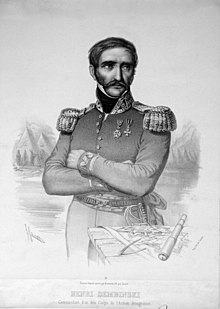Henryk Dembiński
Count Henryk Dembiński , German transliteration Heinrich Dembinski (born January 16, 1791 in Krakow , † June 13, 1864 in Paris ) was a Polish general.
Live and act
Dembinski attended the engineering academy in Vienna between 1806 and 1809 and then joined a Polish hunter regiment as a common soldier. When the campaign against Russia began in 1812 , he was a lieutenant , was appointed captain by Napoléon Bonaparte himself on the battlefield of Smolensk , and in 1813 he fought at Leipzig . In 1815 he returned to his fatherland, where he lived in seclusion.
When the revolution of 1830 broke out , he became a major in a regiment that was being formed in the Kraków Voivodeship , but was soon given supreme command of the area's mobile national guard and fought with this corps in the Battle of Grochów . Soon after, the Oberfeldherr Jan Zygmunt Skrzynecki placed him at the head of a cavalry brigade with which Dembinski held up Field Marshal Diebitsch with an army of 60,000 men for a day in the battle near Kuflew .
A no less brilliant act of arms was the storming of the bridge near Ostrolenka, which was considered impregnable . Dembinski then marched with a small group through the middle of the country flooded by hostile army masses to Warsaw , where he was immediately appointed governor and, after Skrzynecki's resignation, commander in chief, but was replaced in this post by Jan Krukowiecki after a few days . He then joined Rybiński 's corps, led the rearguard when he left Prussian territory, and also crossed the border on October 5, 1831.
Dembinski then went to France and entered the service of Muhammad Ali Pasha of Egypt in 1843 , who entrusted him with the reorganization of the Egyptian army, but soon returned to Paris . In 1848 he left his asylum and tried to establish a connection between the Slavs and the Magyars .
After attending the Slavic Congresses in Wroclaw and Prague, he went to Debreczin , the seat of the Hungarian government at the time, and was appointed commander-in-chief of the main revolutionary army there on February 5, 1849 . But Görgey's jealousy and the troops' aversion to the arrogant foreigner caused him many difficulties. When Dembinski, after the unfortunate battle of Kápolna (February 26-28 , 1849) retreated behind the Tisza, due to ignorance of the terrain, made the wrong arrangements, the entire Hungarian officer corps asked him to abdicate, which the government also accepted.
In the meantime, the rest of the spring campaign, first under Antal Vetters and later under Görgey's high command, was largely carried out according to plans drawn up by Dembinski earlier. Dembinski then worked for several months in the operations office in Debreczin until, in June 1849, when the Russians approached, he was given command of the Hungarian Northern Army . But he resigned before the summer campaign began because his plan to invade Galicia was not approved by the Hungarian government. When, as a result of the differences between Kossuth and Görgei, the command passed from the latter to Lázár Mészáros (July 2), Dembinski was given the role of Quartermaster General , in which capacity he was responsible for the retreat of the Tisza Army to Szegedin and the Battle of Szöreg (5 August).
Dembinski withdrew from here to Temesvár , where he was defeated on August 9th by the Austrian main army under Feldzeugmeister Haynau together with Jozef Bem and his army was completely split up. Dembinski escaped to Ottoman territory with Kossuth and the other heads of the revolution . In July 1850 he moved to Paris, where he has lived in complete seclusion ever since and died on June 13, 1864.
Fonts
- My campaign to and in Lithuania and my retreat from Kurszany to Warsaw . (Ed. Von Walk, Leipzig 1832)
- Mémoires . (Paris 1833)
- Memories about the Hungarian War of 1848 and 1849 . (that. 1849)
- Memoirs on the uprising from 1830 to 1831 . 2 vols. (Polish, Cracow 1878)
literature
- Constantin von Wurzbach : Dembiński, Heinrich . In: Biographisches Lexikon des Kaiserthums Oesterreich . 3rd part. Typogr.-literar.-artist publishing house. Establishment (L. C. Zamarski, C. Dittmarsch & Comp.), Vienna 1858, pp. 230-233 ( digitized version ).
Web links
| personal data | |
|---|---|
| SURNAME | Dembiński, Henryk |
| ALTERNATIVE NAMES | Dembinski, Heinrich (German transliteration) |
| BRIEF DESCRIPTION | Polish general |
| DATE OF BIRTH | January 16, 1791 |
| PLACE OF BIRTH | Krakow |
| DATE OF DEATH | June 13, 1864 |
| Place of death | Paris |

